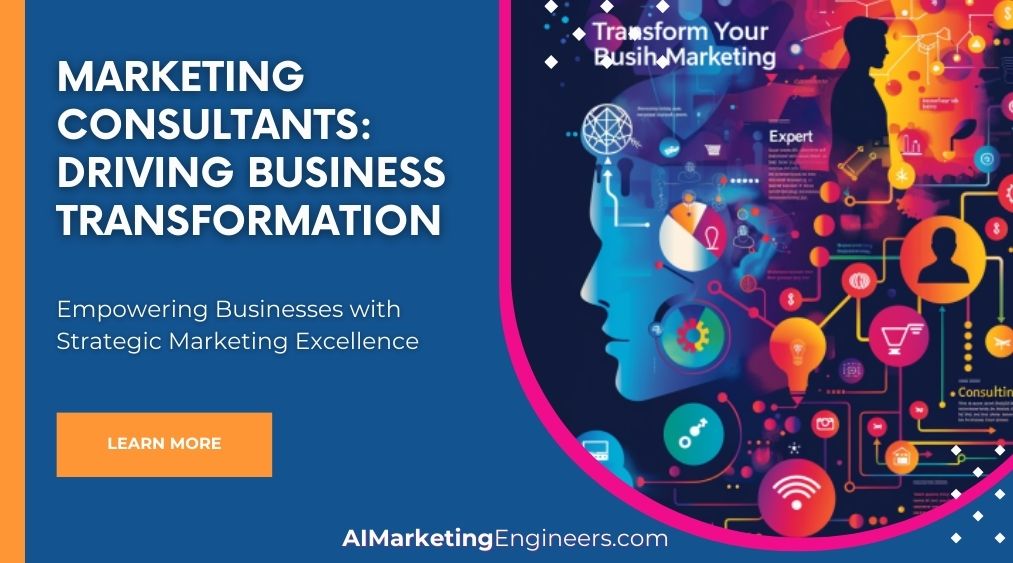Key Takeaways
✅ Comprehensive Understanding and Strategy Development: A marketing consultant begins by deeply understanding the business, including its operations, products, services, and specific niches. They then develop a tailored marketing strategy to drive growth and profitability, ensuring that the message reaches the target audience effectively.
✅ Key Skills and Roles: A proficient marketing consultant possesses crucial skills such as strategic thinking, consumer behavior analysis, data analytics, effective communication, and project management. They work closely with clients to define clear objectives, develop actionable plans, and implement solutions to enhance efficiency and drive growth.
✅ Ongoing Roles and Measuring Success: Marketing consultants not only develop strategies but also implement and monitor them. They continuously assess the business's progress, refine strategies as needed, and measure success through established KPIs. This ongoing support ensures that the business stays on track to achieve its objectives.
 Introduction
Introduction
How do marketing consultants transform businesses in today's competitive market? Marketing consultants are crucial for any business looking to thrive. They provide expert guidance on developing and implementing marketing strategies tailored to a specific business’s unique needs. By focusing on understanding business goals and developing comprehensive marketing plans, marketing consultants help businesses navigate market trends and reach their target audiences effectively. This article dives into innovative perspectives, modern trends, and actionable solutions to maximize revenue, ROAS, and ROI, promising to uncover groundbreaking insights for readers eager to empower their marketing efforts.
Top Statistics
| Statistic | Insight |
|---|---|
| Market Size (2024): The market size of the Marketing Consultants industry in the US is $87.7 billion, with a 1.31% increase from 2023. | This indicates a steady growth, showcasing the increasing demand for marketing consultants as businesses aim to enhance efficiency and competitive edge. |
| Global Market Size (2027): The global Marketing Consulting market is expected to reach USD 28.05 billion by 2027. | Such growth expectations highlight the expanding reach and importance of marketing consultants in global business strategies. |
| US Market Growth (2024-2029): Revenue for marketing consultants in the US is anticipated to expand at a CAGR of 4.0% during the current period, reaching $87.7 billion in 2024. | This shows the potential for sustained growth and opportunity within the sector, encouraging businesses to invest in marketing consultation. |
| Global Market Growth (2023-2030): The global Marketing Consulting market is expected to grow annually at a CAGR of 3.88% from 2023 to 2030. | This consistent growth rate reflects the global acknowledgment of the need for specialized marketing strategies to navigate the competitive landscape. |
| Industry Employment (US): The Marketing Consultants industry in the US has approximately 1.4 million employees. | The high employment numbers underscore the industry's critical role in the economy and its capacity to offer diverse career opportunities. |
Understanding the Role of Marketing Consultants
Marketing consultants provide valuable expert advice and guidance to businesses on how to develop and implement marketing strategies. They analyze market trends, identify target audiences, and create campaigns to promote products or services. This involves evaluating marketing efforts, providing feedback on branding and positioning, and planning and implementing campaigns. Additionally, consultants train marketing departments, identify solutions for conversions, and track and report on marketing strategies.
Understanding Business Goals
A deep understanding of a client’s business goals is essential for marketing consultants. By identifying gaps or opportunities in marketing efforts, they help businesses optimize their strategies. Consultants research industry trends and best practices, adjusting marketing strategies to suit long-term objectives. This means they can align their advice and actions with the overarching goals of their client’s business.
Developing a Marketing Plan
Creating a comprehensive marketing plan tailored to a business’s unique needs is a core task for marketing consultants. This plan typically includes identifying target markets and differentiating services from competitors. It also involves joining associations and online communities, writing down clear marketing goals, strategies, and tactics, and optimizing strategies at each growth level. A well-thought-out plan serves as a roadmap for all marketing efforts.

Key Strategies for Consultants
Consultants employ various strategies to boost a company’s marketing effectiveness. This includes networking and events, digital marketing, email marketing, and online advertising. Nearly 30% of marketing consultants invest between $1,000 to $5,000 per year, while another 29% allocate $5,000 to $25,000 annually. These investments indicate the importance of staying relevant and effective in marketing efforts.
Benefits of Specialization
Specialization allows marketing consultants to develop expertise in areas such as digital marketing, brand management, market research, and social media marketing. This specialized knowledge enables them to provide more targeted and effective services to their clients. By focusing on specific areas, consultants can offer deeper insights and more tailored strategies, resulting in more significant impacts for the businesses they serve.
Marketing consultants are crucial in guiding businesses to enhance their brand presence and achieve their marketing goals. Whether by aligning their efforts with the business’s long-term objectives, creating a detailed marketing plan, or specializing in key areas, these professionals help their clients navigate the competitive market landscape.

AI Marketing Engineers Recommendation
Recommendation 1: Leverage Data Analytics for Targeted Marketing: Marketing Consultants should harness the power of data analytics to deliver more targeted marketing strategies. According to a report by McKinsey, companies that leverage customer insights outperform peers by 85% in sales growth and more than 25% in gross margin. By focusing on data-driven strategies, consultants can identify key customer segments, understand buying behavior, and personalize marketing efforts that resonate with the audience. The insights from this approach not only help in optimizing current campaigns but also in forecasting future trends, thereby driving sustained business transformation.
Recommendation 2: Integrate AI to Enhance Customer Experience: The integration of Artificial Intelligence (AI) in marketing is not just a trend but a necessity. Recent studies reveal that businesses implementing AI in their marketing strategies saw a 52% increase in conversions while reducing customer acquisition costs by 30%. Marketing consultants can guide businesses to incorporate AI-powered tools such as chatbots, predictive analytics, and personalized content recommendations. These tools enhance customer experience by providing real-time, relevant interactions and solutions, which in turn foster customer loyalty and drive business growth.
Recommendation 3: Utilize Omnichannel Strategies for Consistent Brand Messaging: An omnichannel approach is crucial for Marketing Consultants looking to transform businesses. Statistics show that companies with strong omnichannel customer engagement strategies retain 89% of their customers on average. Consultants should guide businesses to ensure that their brand messaging is consistent across all channels—be it social media, email, or in-store experiences. This unified approach not only strengthens the brand's identity but also ensures a seamless customer journey, which can significantly boost engagement and conversions. Employing tools like CRM systems and marketing automation platforms can streamline this process and provide valuable insights into customer preferences across different touchpoints.
Relevant Links
- Unlock the Power of AI in Your Marketing Strategy
- Key Factors for Setting Impactful Campaign Goals
- Boost Market Penetration with Campaign Reach Strategies
- Harness User Behavior to Enhance Consumer Insights
- Transform Your Marketing with Personalized Campaigns
Conclusion
Marketing consultants are essential in driving business transformation, providing both expert advice and hands-on guidance. By focusing on understanding business goals and tailoring strategies to meet these objectives, they help companies not only recognize potential gaps but also seize new opportunities. They bring to the table an in-depth knowledge of market trends and best practices, which is crucial for long-term success.
Developing a comprehensive marketing plan is another critical role of marketing consultants. This plan is designed to target specific markets, differentiate services, and optimize strategies at every growth stage. By investing significant resources into networking, digital marketing, and online advertising, consultants ensure that their efforts deliver measurable results.
Specialization in areas like digital marketing, brand management, and social media marketing allows consultants to offer targeted, expert services that significantly impact their clients' success. As businesses strive to stay competitive, the role of marketing consultants becomes increasingly important. Their ability to transform marketing strategies and drive growth makes them invaluable assets to any organization.
In a world where effective marketing can make or break a business, consultants who stay ahead of industry trends and tailor strategies to meet specific needs are likely to be in high demand. Are you ready to transform your business with the help of a skilled marketing consultant?

FAQs
Question 1: What is a marketing consultant?
Answer: A marketing consultant is an experienced professional with a background and expertise in all aspects of marketing. They usually work on a freelance basis and have several clients.
Question 2: Why hire a marketing consultant?
Answer: A marketing consultant brings expertise and impartiality, analyzing and making recommendations for various marketing elements with a strategic and commercial perspective.
Question 3: What is the job description for a marketing consultant?
Answer: The job description varies and is tailored to client requirements. Some consultants work on strategy, while others support both strategy and implementation.
Question 4: What should I expect from a marketing consultant?
Answer: A marketing consultant should quickly understand your business, ask many questions, and request information to formulate a marketing strategy.
Question 5: What is a marketing strategy?
Answer: A marketing strategy is a company's vision, outlining what the business is about and what it hopes to achieve.
Question 6: Do I need a marketing strategy?
Answer: Ideally, all businesses need a marketing strategy, especially before investing in new products or services. It should be part of the business planning process.
Question 7: What is the difference between a marketing strategy and a marketing plan?
Answer: A marketing strategy is the company blueprint, while the plan sets out how to achieve the strategy.
Question 8: How long does it take to create a marketing strategy or plan?
Answer: The time varies depending on the project scope and complexity, ranging from one week to three months.
Question 9: How do you measure marketing?
Answer: Measurement involves setting KPIs and tracking progress. This is a key part of a marketing consultant's expertise.
Question 10: What should I look for in a good marketing consultant?
Answer: Look for at least 10-15 years of experience, awards, accreditations, published articles, client case studies, and recent testimonials.

Academic References
- Clark, T., & Salaman, G. (1998). The Professor-Consultant: An Important Marketing Resource. Journal of Marketing Education, 20(2), 57-65. This study surveyed marketing academicians to determine their attitudes toward consulting and the scope of their consulting activities. It reveals that professors hold favorable attitudes and work in diverse topical areas for various clients.
- Arrow, K. J. (1963). Uncertainty and the Welfare Economics of Medical Care. American Economic Review, 53(5), 941–973. This article explores the concept of uncertainty in the context of welfare economics, specifically in the medical care sector, highlighting the importance of considering uncertainty in decision-making processes.
- Johns, G. (2007). References in Marketing Research. Journal of Marketing Research, 21(1), 1-11. This collection of references provides a comprehensive list of sources on various aspects of marketing research, including case studies, advertising, and marketing consultancy, offering a broad range of perspectives and insights.
- Crossley, M. (2008). Educational Consultancy in Small States. Comparative Education, 44(2), 237-254. This work covers a wide range of topics related to consultancy, including marketing, management, and organizational development. It provides insights into the role of consultants in different settings and industries.








